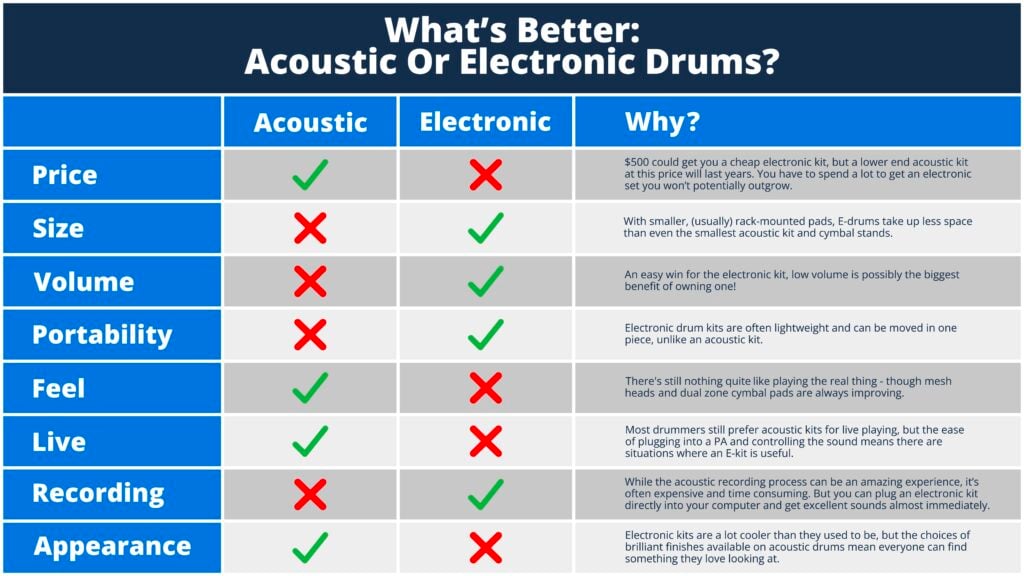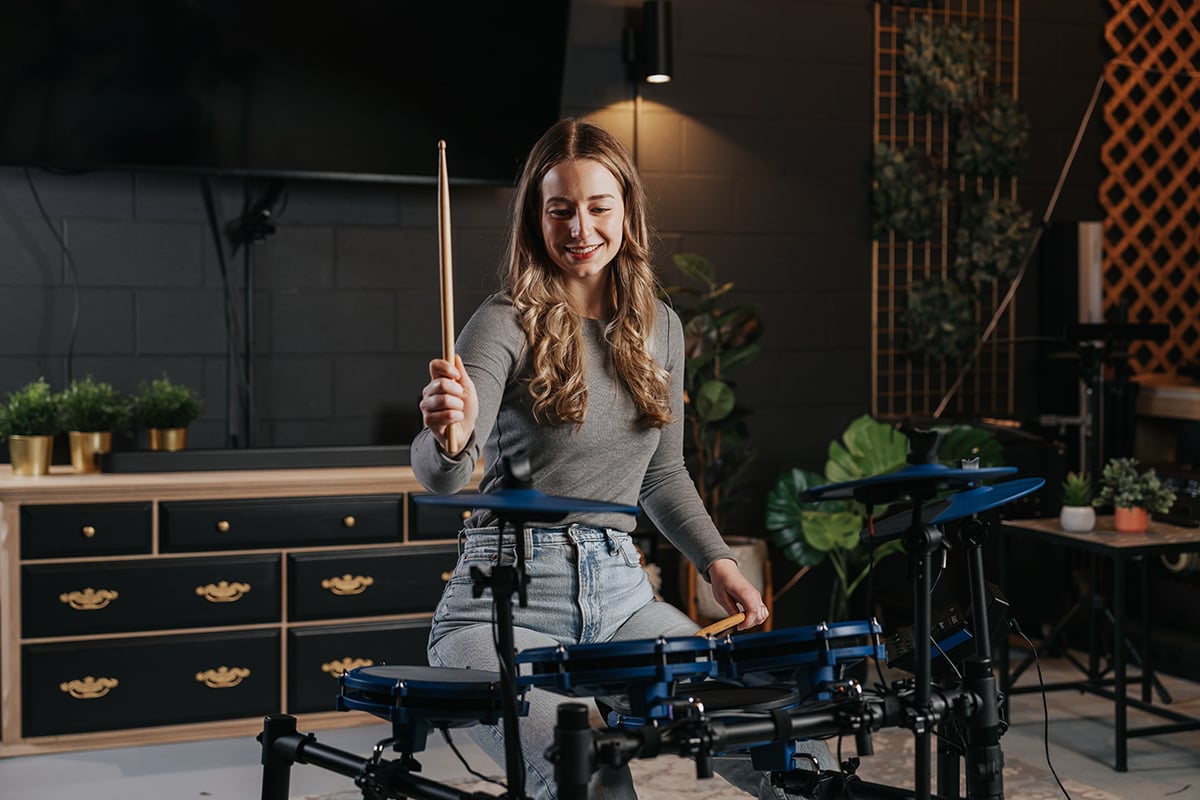Since electronic drums hit the mainstream market in the early ’80s, they’ve been fighting for their place in the spotlight.
“You’ll never be us,” scream the acoustic kits. “You wish you were us!”
But in recent years, e-kits have become more affordable, more user-friendly, and cooler looking than their ancestors. Some even look like acoustic drums, only revealing their true selves when you start to play.
Whether you’re learning the drums, a hobbyist or a pro, you might be stuck choosing between drums that go ‘boom’ and drums you plug in.
To help you make a decision, we’ve outlined the key differences between acoustic and electric drum kits.

Acoustic drum kits rely on the physical impact of drumsticks on a drum skin (also known as a drumhead), to generate sound. Each strike causes the top and bottom drumheads to vibrate, resulting in the note you hear.
The shell material, its size, the type of drumhead, and what you hit it with all affect the sound.
In contrast, electronic drum kits use a trigger sensor and drum module (or “brain”) to generate sound on impact. This sound, a “sample,” is triggered by the hit.
Think of it this way: playing an acoustic drum is like talking. Playing an electronic drum is like pressing play on a recording of your voice.
When striking an electronic drum, you’re telling it to make a sound. While the pad you hit can vary in what it’s made from and how it feels, the process is the same across all electronic kits.
Authenticity: An acoustic drum kit gives you what you expect: that genuine, classic sound. Unfiltered resonance shows the nuances and natural imperfections of your playing.
Dynamics: Whether you’re approaching the kit with a delicate wire brush or attacking the drums with full-bodied Dave Grohl-style flams, you’ve got the entire spectrum of volume at your fingertips.
Physical feel: What’s more satisfying than the feedback of the sticks on the kit and cymbals? This is also a great learning tool: it’s massive to understand the way the strike feels to the sound it creates.
Inspiration: There’s a reason the big drum companies have signature ranges and a roster of endorsers: we want to play and sound like our heroes! Is that Phil Collins Gretsch going to make you want to play? Is playing along to Led Zeppelin on a vintage Ludwig your idea of awesome? Drums are cool. And it can be inspiring to play on a beautiful instrument made by an expert hand.
Volume Control: It may be one of the things we love about them, but drums are loud! Without soundproofing, you might upset somebody if you’re playing at home.
Footprint: A complete kit with hardware can take up a lot of space. This might not be practical if you’re trying to fit something into the corner of a room.
Maintenance/breakables: You’ll have to learn how to tune drums, maintain them, and replace drum heads. Depending on how you play, you may break a cymbal, and it could cost hundreds of dollars to replace it.
Volume control: This is a huge plus for an electronic kit. While not silent, the ability to put on headphones and not bother anyone while you practice away is massive. You can also buy sound reduction mats to absorb the vibrations so you can make even less noise.
Multiple sounds: Electronic sets come with many pre-loaded ‘kits’ to play on. These sample packs, recorded by top drummers in professional studios, let you instantly change your sound. Depending on the specs of the kit, you can alter the shell materials and sizes, heads and room size, and save your perfect kit settings.
Recording: It’s easy to record electronic drums; most kits have a direct out that can plug straight into your computer or an audio interface. You have infinite possibilities from there. Your kit can trigger any sound in your Digital Audio Workstation (DAW). The best part is you can use a relatively modest kit to trigger album-quality recordings.
Size and portability: While some flagship models are catching up with acoustic kits for size, electronic kits are often mounted on one rack and can be lifted and placed easily. If space is an issue, you can shop with that in mind and find something to fit the area you’re working with.

Neighbor-friendly drums that let you play your favorite songs in your smallest room at home.
Get the highest-rated beginner e-kit AND a 1-year membership to Drumeo!
Dynamics: This is constantly improving and is more apparent at the lower end of the market, but you’re at the mercy of the trigger’s interpretation of how the pad was hit. Sometimes you can hit loud but hear quiet, and vice versa. Higher end kits do this better, but it’s still not perfect.
Physical feel: Some players will feel this more than others, but you may get frustrated on a lower end electronic kit if you’re a hard hitter. Rubber pads can feel flimsy and unrealistic, and smaller kits can move around after some playing. Try to get mesh heads where possible, at least on the snare drum.
Final verdict
The joy of playing a well-made, perfectly tuned acoustic kit is hard to match for any drummer. And if you’re just starting out, try to get as much exposure on an acoustic kit as possible. Understanding dynamics and learning to control your hits is a critical part of your vocabulary as a musician.
But the best equipment in the world is only useful if you can play it!
The beauty of an electronic kit is that you can get the hours in without annoying your parents, housemates, or neighbors. Whether that’s learning how to play, practicing for an audition, or extra time playing to get tour-ready, access to a drum kit and being able to turn the volume down is an amazing option for many of us.
It ultimately comes down to your situation and goals. Many people have both an acoustic and electronic kit. Some can’t stand one of the two, and others just haven’t found their kit yet.
What kind of drums are you looking for? What’s going to help you on your drumming journey?
Edited by Sam Landa, Content Marketing Manager at Drumeo